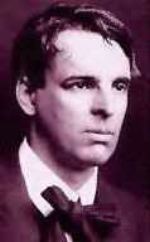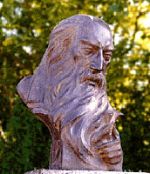Is there anyone in the universe
by Ramakrishna
English version by Lex Hixon
Is there anyone in the universe,
among heavenly or earthly beings,
who can understand what Kali is?
The systems of all traditions
are powerless to describe Her.
Is Mother a feminine being
or greater than Being itself?
Chanting Her transforming Name —
OM KALI OM KALI OM KALI,
empowers Lord Shiva,
Who is transcendent Knowledge,
to drink the negativity of all beings,
turning His Throat dark blue.
Without Her protection
such poison would be deadly,
even to the highest Divinity.
More than Creator and creation,
Mother is sheer Creativity
beyond the notion of duality.
Universe and Father-God
are thrilling glances
from Her seductive Eyes.
Always pregnant with ecstasy,
She gives birth to manifest Being
from Her Womb of primal Awareness,
nursing it tenderly at Her Breast,
then playfully consumes Her Child.
The world dissolves instantly
upon touching Her white Teeth,
attaining the realization
of Her brilliant Voidness.
The various Divine Forms
that manifest throughout history
take refuge at Her Lotus Feet.
The Essence of Divinity,
the Great Ground of Being,
lies in ecstatic absorption
beneath Her red-soled Feet.
Is Mother simply a Goddess?
Does She need a male consort
to protect or complete Her?
The cycle of birth and death
bows reverently before Her.
Is She simply naked
or is She naked Truth?
No veil can conceal Her.
Her naked radiance slays demons
not with weapons but with splendor.
If Mother is a conventional wife,
why is She dancing fiercely
on the breast of Shiva?
Her timeless play destroys
conventions and conceptions.
She is primal purity,
Her ecstatic lovers are purity.
Purity merges into purity,
with no remainder.
I am totally inebriated
by Her wine of timeless bliss.
The wine cup is Her Name —
OM KALI OM KALI OM KALI.
Those drunk on ordinary wine
assume I am one of them.
Not everyone will encounter
the dazzling darkness
called Goddess Kali.
Not everyone can consciously receive
the infinite treasure of Her Nature.
The foolish mind refuses
to perceive and accept
that She alone exists.
Even the noble Lord Shiva,
most enlightened of beings,
can barely catch a glimpse
of Her flashing crimson Feet.
The wealth of world-emperors
and the richness of Paradise
are but abject poverty
to those who meditate on Her.
To swim in a single Glance
from Her three Cosmic Eyes
is to be immersed
in an ocean of ecstasy.
Not even Shiva, prince of yogis,
can focus upon Her dancing Feet
without falling into trance.
Yet the worthless lover
who sings this mad song
aspires to conscious union with Her
during waking, dream, and deep sleep.
 — from Great Swan: Meetings with Ramakrishna, by Lex Hixon
— from Great Swan: Meetings with Ramakrishna, by Lex Hixon

/ Image by Chobist /
Happy Mother’s Day. It is worth remembering today that Mother’s Day was originally created as a day of international peace as a reminder to us all that every single person on all sides of every conflict has a mother who loves them. It was hoped that remembering this would make war difficult to justify.
It is also worth remembering today that we are all children of the Divine Mother.
In Hindu tradition and metaphysics, the Goddess represents many aspects of the Divine. The iconography we find in Hinduism gives us a fascinating kaleidoscope of meaning. The Goddess can represent Mother, the Great Source, the Void/Womb from which all are born, Manifestation, Creation, Vibration, Speech, Song, the Arts, Beauty, Darkness, Mystery, all of the World (and all its Illusions). But with birth, also comes death, with manifestation, also comes dissolution; anything with a beginning also has an end. Only the eternal is eternal. So the Goddess, Mother and Manifester, is also sometimes portrayed as Destroyer. She is Life and Death both. She is the Power that brings all into being, animates and enlivens the universe, and also draws it back into non-being. But even in Her fiercest aspect, the Mother Goddess is loving. For Her, death is merely the death of illusion and the return to Self.
This poem — I call it a poem, but it is more of an ecstatic utterance by the great Ramakrishna — plays with a particular descriptive challenge in the representations of Kali. On the one hand, Kali is a Goddess, often paired with the God Shiva. A popular representation of the two is with Shiva lying prone on the ground, while Kali dances upon his breast, slaying demons. It can be a disturbing image to people not familiar with the iconography of Kali. But what is it saying, and how does it fit in with the philosophy of this gentle, greatly revered Hindu saint, Ramakrishna?
Hinduism often expresses the fundamental polarity of Male and Female in images of the divine couple, the God and Goddess paired together. Within this God-Goddess dichotomy, the masculine aspect of the Divine usually represents transcendent spirit, while the feminine expresses manifestation, power, and action. So prone Shiva represents the transcendent, which is inactive, but which holds the divine potential. Kali dances upon his breast, representing that potential coming into manifestation. Through Her sheer power, Kali destroys the demons that represent illusion and disharmony.
But, just as this God-Goddess pairing represents different facets of the Divine, any God or Goddess can simultaneously be understood to embody the whole of the Divine. In this way, Kali can both be an aspect and also the Absolute.
And this is what Ramakrishna is teasing us with here. Is Kali the consort of Shiva? Is She the feminine aspect of God, or God entire?
Is Mother a feminine being
or greater than Being itself?…
Is Mother simply a Goddess?
Does She need a male consort
to protect or complete Her?
Even within Hinduism and its rich, varied depictions of the Feminine aspect of the Divine, there is still a tendency to elevate the Male forms, such as Shiva. Ramakrishna seems to delight in overturning convention. To him, one must simply follow the Mother and, as She reveals more and more of Her nature — her manifestation, her play of illusions and revelations — our vision of Her expands to encompass the All. To Ramakrishna, the Goddess is Mother and Consort, but She is equally the Totality itself. He taunts us to untangle that conundrum through our own direct perception.
Whether we are talking about Kali or Saraswati or Cerridwen, Mother Mary or Shekinah, let us not forget to honor the feminine in the Divine — and in our world, and in ourselves.
=
I should mention that there is some question about the attribution for this poem. I know that Ramakrishna often quoted Ramprasad, but the source I found this in seems to be attributing it directly to Ramakrishna, though the attribution is not specific. In the same book, the author mentions how Ramakrishna would often break into spontaneous song, making up lyrics as insight and inspiration flooded through him, but also sometimes interweaving famous lines from Ramprasad and others, as well. So the truth is, I don’t know for certain who the poet is. This poem could be by Ramprasad (though I haven’t come across another version of this attributed to Ramprasad), or it could include a few lines by Ramprasad, or it could be entirely original to Ramakrishna. I’d love to hear if you know any more about these verses.
Recommended Books: Ramakrishna
Continue Reading »
 — from The Collected Poems of W. B. Yeats, by William Butler Yeats
— from The Collected Poems of W. B. Yeats, by William Butler Yeats












